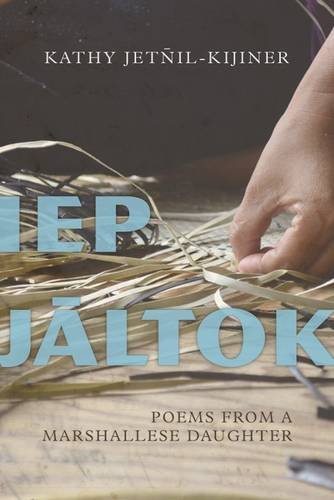As a poet, I naturally have an obsession with language. I pay attention to conversations to pick up phrases and images that I find beautiful, fishing for little moments that I can insert into stanzas of writing – this applies to both the Marshallese and English language. But while I pay attention to the Marshallese language and make a conscientious effort to include it within my poetry to reflect the way that it permeates my everyday experience, I also have to admit that I just don’t have a depth of understanding with Marshallese that I have with English. I don’t speak fluent Marshallese. In fact, I speak broken Marshallese. And this (sigh) is a constant source of shame and embarrassment for me. AND also a constant source of poetry! (Yaaaay.)
At one time in my life I remember when I spoke and thought in pure, unfiltered Marshallese, with no taint of an English accent. My earliest memory is of scribbling on a piece of paper with my aunt and proudly announcing “Look I can speak English!” and proceeded to read from my scribbles and do an impersonation of what I thought sounded like English. “Sheshesheshe,” I babbled to my aunt, who only nodded encouragingly instead of just shattering my childhood world like she should have. I guess at that age English just sounded like a bunch of “s” sounds to me. Which makes sense, I guess, since there is no “s” in the Marshallese language.
It’s interesting to note that this memory I have is in English – as I remember what I said to be in English. But I must have been speaking Marshallese or at least that’s what I gather from what I said to my aunt. Which means that even my memories have been translated. Every piece of dialogue from my past, every Marshallese sound – erased.
When I came back to the Marshalls after college, one of the first things I had to confront was this severe inadequacy. I enrolled in a beginner’s Marshallese class at College of the Marshall Islands along with a bunch of foreigners. (Talk about depressing.) I bought spoken Marshallese and also a Marshallese handbook by a world teach. (Again – depressing.) Suddenly, I was learning Marshallese from a book. I was learning Marshallese from a book written by an American. (How. Ironic.) I guess I could say something here about how it makes it even worse that I’m learning my own language from an American handbook because of the fact that it was the American culture that encouraged the trope of white washing the immigrant so hard that even my parents and teachers believed that I could gleam bright and brilliant if there was no trace of my original culture. But I digress.
Either way, between the lines of those texts teaching me my own language and between hearing the warbled conversations around me, I was, at some point, inspired. I heard and read a poem waiting to be born. A poem that was full of embarrassment.
For a few of these embarrassing poems, I decided on using the format of those Spoken Marshallese texts – warping them and editing them to display the act of relearning one’s language and culture. It allowed me a little distance without ripping open the wound, and added a little textual fun for me as a poet.
Relearning my language is a constant struggle that I will probably be grappling with for the rest of my life. It also makes me pay attention to language and appreciate it in my own way. Hopefully, at some point, I’ll be able to compose an entire poem in Marshallese, with the same ease and comfort that I have with English. Until then, I’ll keep going back to my Spoken Marshallese and Marshallese dictionary. I’ll keep consulting my family members to check my written Marshallese. And I’ll keep practicing the language – with a touch of compassion, patience, and a little sense of humor to keep me afloat. And I’ll keep writing these embarrassing-ass poems.
Spoken Marshallese Lesson Nine: A Conversation Drill
You will often be questioned by other Marshallese, especially those born and raised at home. This is a good chance to practice the proper response (you will practice as B).
A: Kwojela ke enwor? Do you know how to fish?
B: Ijaje. Kwomaron ke katakin io? I don’t know how. Can you teach me?
A: Kwojela ke inon? Do you know how to tell Marshallese legends/stories?
B: Ijaje. Kwomaron ke katakin io? I don’t know how. Can you teach me?
A: Kwojela ke kowainini? Do you know how to pick coconuts?
B: Ijaje. Kwomaron ke katakin io? I don’t know how. Can you teach me?
A: Kwojela ke umum ma? Do you know how to cook breadfruit in the earth?
B. Ijaje. Kwomaron ke katakin io? I don’t know how. Can you teach me?
A: Ijjab kanuij jella, ak inaj kajion. I’m not an expert – but I can try.

The book you were using… Was it “Practical Marshallese” by Peter Rudiak-Gould? 🙂